The Oscar® nominee and star of Les Misérables the novels and memoirs that revved him up and pointed him toward his own path and passion.
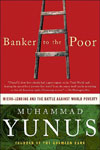
Banker to the Poor
By Muhammad Yunus
As I said, this is the autobiography of a man I admire tremendously. He was an economics professor in Bangladesh during the 1970s famine, and he felt sick to his stomach that he was teaching economic theories while passing dead bodies in the street. So he dismantled his curriculum and encouraged his students to go out with him to the poorer districts to understand what kept people impoverished. He eventually loaned $27 from his own pocket to 42 stool makers. He told banking officials that if you take somebody's life and possibility of a future as a form of collateral, it will be much more valuable than traditional collateral. He was right. Grameen Bank, which he established, has given out $6.3 billion worth of loans, and they have a 98 percent return rate, higher than many other loans. But what I loved about Yunus is that he wanted to be a teacher, but he couldn't turn away from what he saw. The universe or God or whatever you want to call it is giving us signs all the time about which way to go, and Yunus followed them. In doing so, he's revolutionized the world, creating one of the most practical and lasting solutions to poverty.
By Muhammad Yunus
As I said, this is the autobiography of a man I admire tremendously. He was an economics professor in Bangladesh during the 1970s famine, and he felt sick to his stomach that he was teaching economic theories while passing dead bodies in the street. So he dismantled his curriculum and encouraged his students to go out with him to the poorer districts to understand what kept people impoverished. He eventually loaned $27 from his own pocket to 42 stool makers. He told banking officials that if you take somebody's life and possibility of a future as a form of collateral, it will be much more valuable than traditional collateral. He was right. Grameen Bank, which he established, has given out $6.3 billion worth of loans, and they have a 98 percent return rate, higher than many other loans. But what I loved about Yunus is that he wanted to be a teacher, but he couldn't turn away from what he saw. The universe or God or whatever you want to call it is giving us signs all the time about which way to go, and Yunus followed them. In doing so, he's revolutionized the world, creating one of the most practical and lasting solutions to poverty.
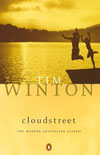
Cloudstreet
By Tim Winton
I was living in London when this novel was published. Reading it was like being able to fly home. I had just spent three years studying acting in Perth, and I knew the areas Winton writes about—the smells, the lights, the type of people. It was one of the most evocative Australian books I've ever read. Two families, who are complete opposites, share a ramshackle house. The Lambs are a more industrious sort of family. The Pickles—they're a gambling family. The characters are flawed; they suffer unbelievable pressures and hardships, and yet they share this desire for community. I found it absolutely beautiful and life affirming.
By Tim Winton
I was living in London when this novel was published. Reading it was like being able to fly home. I had just spent three years studying acting in Perth, and I knew the areas Winton writes about—the smells, the lights, the type of people. It was one of the most evocative Australian books I've ever read. Two families, who are complete opposites, share a ramshackle house. The Lambs are a more industrious sort of family. The Pickles—they're a gambling family. The characters are flawed; they suffer unbelievable pressures and hardships, and yet they share this desire for community. I found it absolutely beautiful and life affirming.
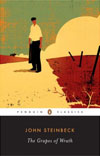
The Grapes of Wrath
By John Steinbeck
This was another book I read when I was in London doing the musical Oklahoma! with Trevor Nunn, who loves to think of everything in naturalistic terms. Oklahoma! is set about 20 years before The Grapes of Wrath. It shows American farm life before the Dust Bowl, and The Grapes of Wrath, obviously, is what came next. I was mesmerized by Tom Joad. He's living a very egocentric life at the beginning of the novel, but along his family's arduous trip to California, he is transformed into someone else entirely. I think the turning point occurs once he's finally found work picking peaches. He's so happy that he can feed his family, but he then discovers that he's a strikebreaker. He's faced with an impossible dilemma: He's either supporting his family or putting the livelihoods of others in his community at risk. I connected with that arc of going outward. It wasn't so long ago that my life was just all about me. Right around the time I read that book, of course, I was married and gradually realizing that with the opportunities you get you have responsibility beyond your family, beyond your community—and if you have some power to do things, you should do them.
By John Steinbeck
This was another book I read when I was in London doing the musical Oklahoma! with Trevor Nunn, who loves to think of everything in naturalistic terms. Oklahoma! is set about 20 years before The Grapes of Wrath. It shows American farm life before the Dust Bowl, and The Grapes of Wrath, obviously, is what came next. I was mesmerized by Tom Joad. He's living a very egocentric life at the beginning of the novel, but along his family's arduous trip to California, he is transformed into someone else entirely. I think the turning point occurs once he's finally found work picking peaches. He's so happy that he can feed his family, but he then discovers that he's a strikebreaker. He's faced with an impossible dilemma: He's either supporting his family or putting the livelihoods of others in his community at risk. I connected with that arc of going outward. It wasn't so long ago that my life was just all about me. Right around the time I read that book, of course, I was married and gradually realizing that with the opportunities you get you have responsibility beyond your family, beyond your community—and if you have some power to do things, you should do them.
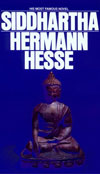
Siddhartha
By Hermann Hesse
I was given this book as I was going off to drama school. Acting, to me, was the most potent way to find out who you were and what life was about, and this book—about a young man who follows the rules but questions what is true, not for his father or for the community but what is true for himself—confirmed that, yes, I'm on the right path. Siddhartha's quest is a reminder that we always have to find our own truth. I'm a bit of a zealot about this book—I've probably given away about 100 copies.
By Hermann Hesse
I was given this book as I was going off to drama school. Acting, to me, was the most potent way to find out who you were and what life was about, and this book—about a young man who follows the rules but questions what is true, not for his father or for the community but what is true for himself—confirmed that, yes, I'm on the right path. Siddhartha's quest is a reminder that we always have to find our own truth. I'm a bit of a zealot about this book—I've probably given away about 100 copies.
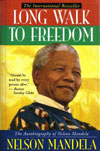
Long Walk to Freedom
By Nelson Mandela
This story of Mandela's life is incredibly engrossing. As he recounts those 27 years in prison on Robben Island, what struck me is how someone can go through all this and maintain a sense of peace and equanimity even toward the people who put him there. One passage in the last chapter shocked me: "My commitment to my people, to the millions of South Africans I would never know or meet, was at the expense of the people I knew best and loved most." Despite all the great things he did, he's aware of his own failings—that he was not the father he should have been. I think we are blessed to live during the time that he is alive.
By Nelson Mandela
This story of Mandela's life is incredibly engrossing. As he recounts those 27 years in prison on Robben Island, what struck me is how someone can go through all this and maintain a sense of peace and equanimity even toward the people who put him there. One passage in the last chapter shocked me: "My commitment to my people, to the millions of South Africans I would never know or meet, was at the expense of the people I knew best and loved most." Despite all the great things he did, he's aware of his own failings—that he was not the father he should have been. I think we are blessed to live during the time that he is alive.




